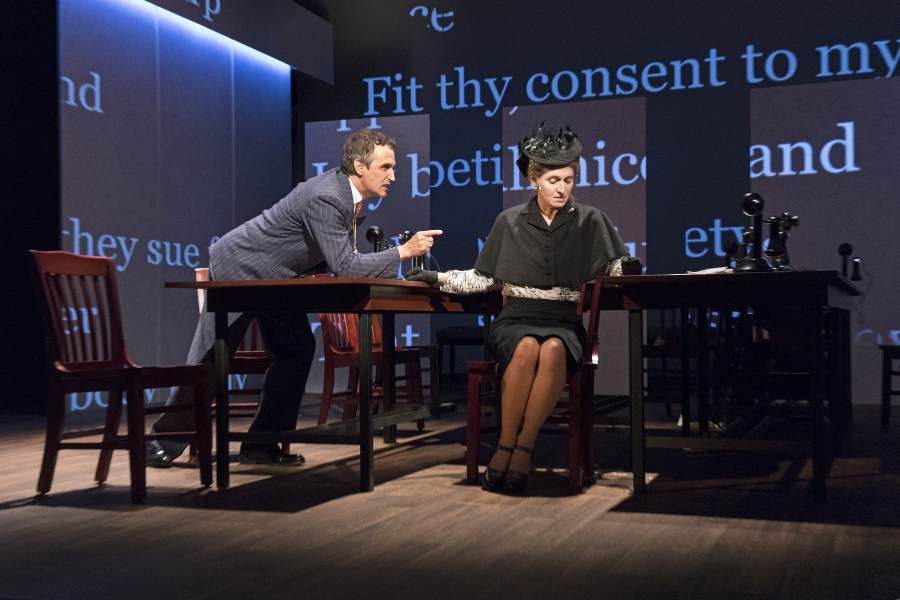

For their first foray into Shakespeare, Elevator Repair Service, New York’s stalwarts of experimental theatre, tackle Measure for Measure at the Public Theatre. ERS delivers a screwball, slapstick rendering of the Bard’s problem play that is in turns hilarious, bizarre and inscrutable — entirely inscrutable, I might venture, for someone who isn’t familiar with the text. To crib the comment of a fellow audience member: “I wouldn’t want this to be the only Measure for Measure I ever saw.” But anyone who’s familiar with the company’s take on The Sound and the Fury, The Great Gatsby, The Sun Also Rises, and others knows that you can’t expect a straightforward rendering from artistic director John Collins and co.; they find a unique way into each text they interpret.
At The Public’s LuEsther Theater, the text of the play has a near constant physical presence, scrolling up and down and sideways along the walls throughout — in part as a way to set the actors’ pace, director Collins writes. And the pace of the two-hour, no intermission run is often break-neck. To achieve this tight performance, the company frequently speeds unintelligibly through chunks of monologue and dialogue alike. Meanwhile, in a 1930s styled Marx Brothers tribute, the action takes place in frenetic loops around, on top of, and behind a large, horseshoe desk that nearly fills the stage.
In the play’s best moments, the troupe’s approach works to expose the more absurd thematic elements of the text, which walks a very fine line between serious moralizing and lighthearted comedy (I’m thinking of a gruesome bit of slapstick involving severed heads). Scott Shepherd is a strong lead as the voyeuristic Duke, finding a balance between the sinister and sanctimonious aspects of the character. But Pete Simpson steals the show as Angelo, the rule abiding Duke-in-Absentia who is nearly tempted to gross hypocrisy by Isabella (played with seriousness and charm by Rinne Groff), a soon-to-be-nun who pleads for the life of her brother Claudio, sentenced to die for impregnating his girlfriend. As Angelo wrestles with his lust for Isabella, his fits and furies explode beyond his body in spasmodic tantrums cum interpretive dance moves. Vin Knight provides laughs as the blundering lackey Escalus.
ERS’s Measure for Measure is a fitting addition to The Public’s Astor Anniversary Season. For Shakespeare purists, this interpretation may strike as overly-avant, and complete novices may find themselves in the dark, but for the many of us somewhere in the middle, it’s a one-of-a-kind tribute. It demonstrates the endless ways Shakespeare can be reinvented and reasserted as a salient voice for our time and for centuries to come.